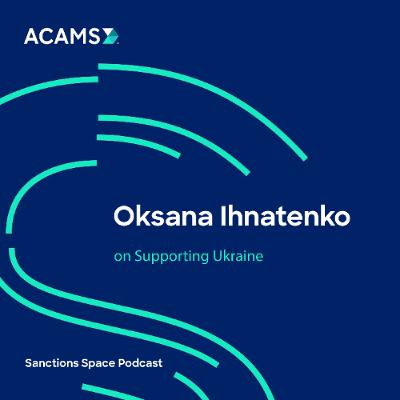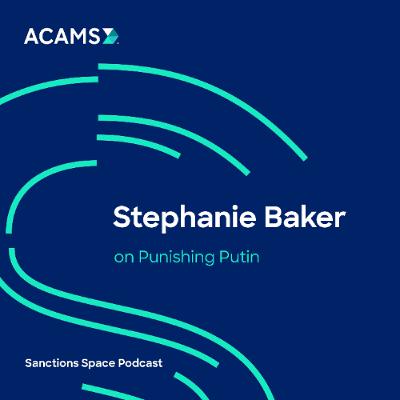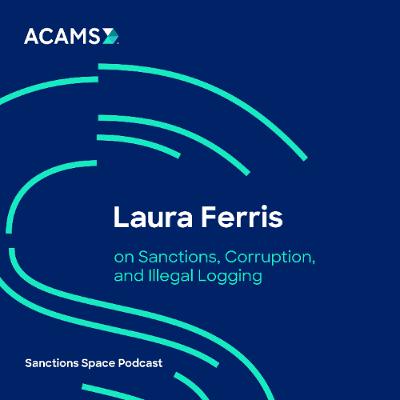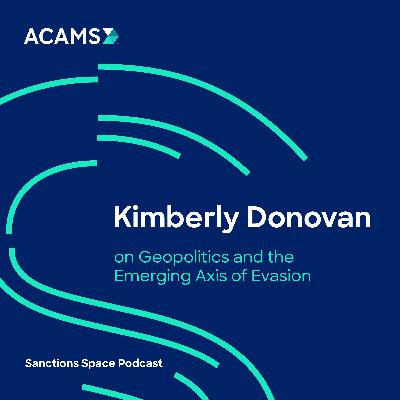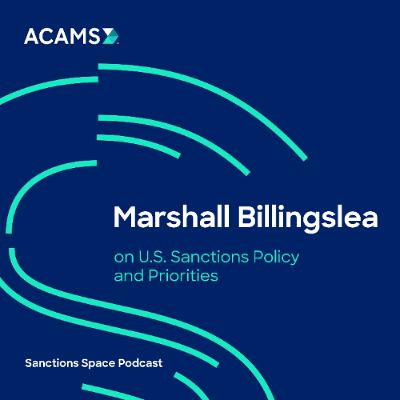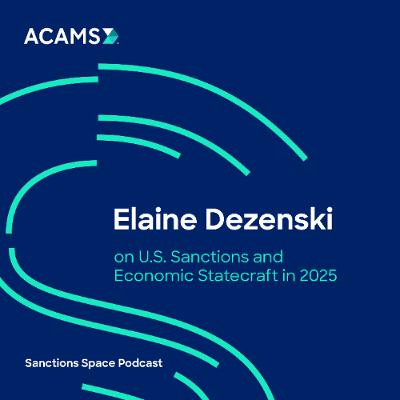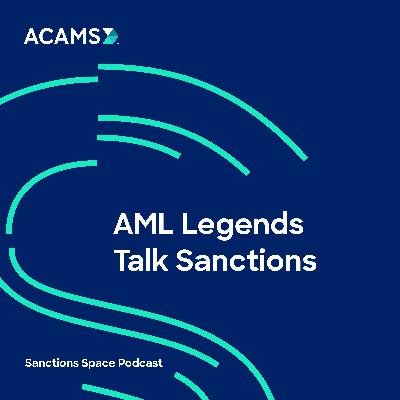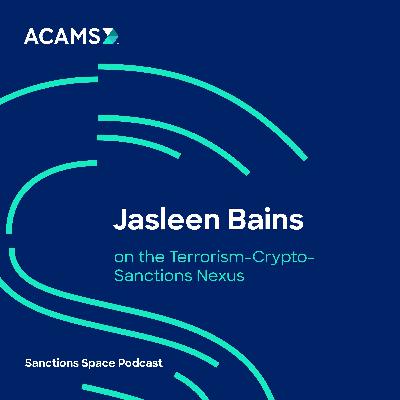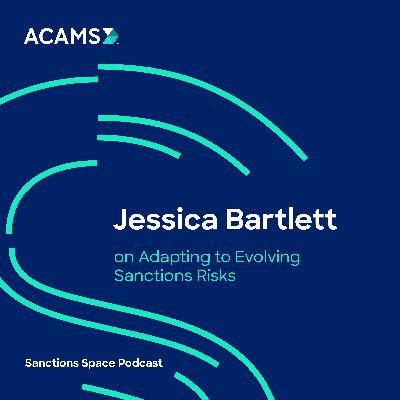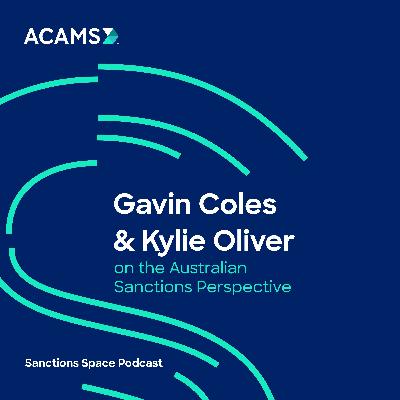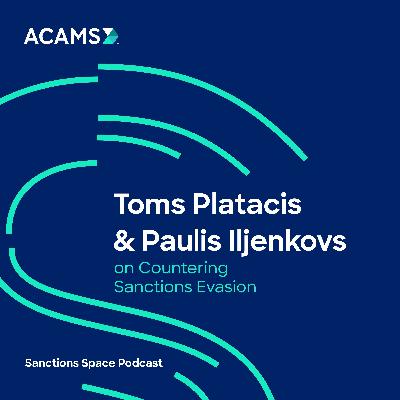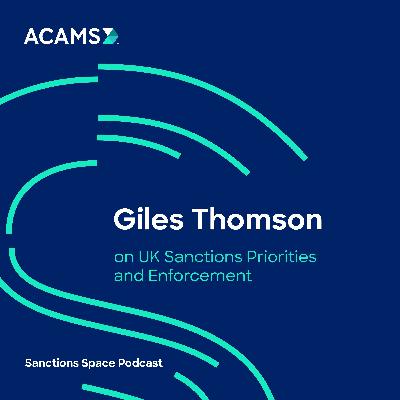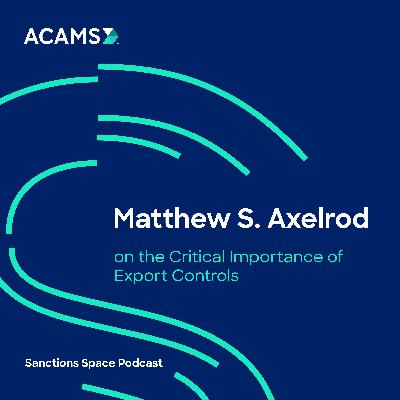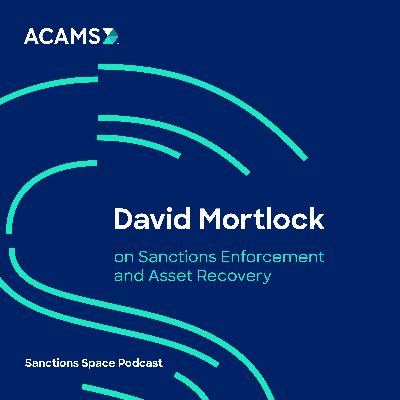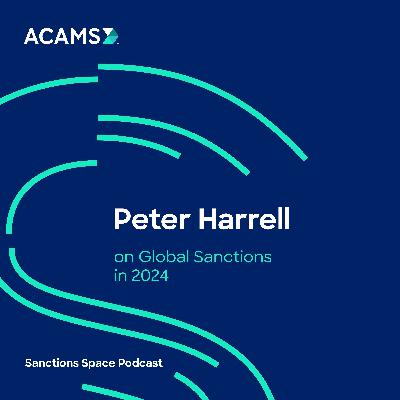Discover Sanctions Space
Sanctions Space

45 Episodes
Reverse
At the ACAMS Las Vegas Assembly, Justine sat down with Oksana Ihnatenko, RUSI, and ACAMS Rising Professional of the Year. Their discussion includes Oksana’s research and work to build public-private partnerships in Ukraine, how Ukrainians view current sanctions policy, and how Ukraine’s reconstruction can be funded.
Oksana Ihnatenko is a Researcher for the Supervising and Monitoring Ukraine’s Reconstruction Funds (SMURF) project at the Centre for Finance and Security at RUSI, based in Kyiv. Her research focuses on Ukraine's adherence to FATF standards, fighting financial crime, anti-money laundering efforts, and issues surrounding reconstruction. You can read more here. https://www.rusi.org/people/ihnatenko
At the ACAMS Las Vegas Assembly, Justine sat down with Carole House, Senior Distinguished Fellow, ACAMS. Their discussion includes the AFC implications of generative artificial intelligence, including increasing sophistication of deepfakes and the resulting ‘authenticity crisis’, how we can build resilience to the threat, and trends in cyber-enabled sanctions evasion.
Carole House recently joined ACAMS as a Senior Distinguished Fellow. Among Carole’s many prominent and senior roles, she previously served as the White House National Security Council (NSC) special advisor for cybersecurity and critical infrastructure policy.
At the ACAMS Las Vegas Assembly, Justine sat down with Alex Zerden, Capitol Peak Strategies. Their discussion covers a range of U.S. sanctions priorities, including significant action undertaken on both drug cartels and Iran, easing measures on Syria, and the implications of a U.S.-backed stablecoin.
Alex Zerden is the Founder and Principal of Capitol Peak Strategies, a risk advisory firm based in Washington, DC. Capitol Peak works with leading financial institutions, companies and organizations to navigate emerging technologies, financial regulation, and economic crisis.
At the ACAMS Europe Assembly in Paris, Justine sat down with Stephanie Baker, Senior Writer, Bloomberg. Their discussion includes how Russia has exploited loopholes to circumvent sanctions and export controls and continue financing its war, how Russia’s wartime economy may impact peace negotiations, and how the new economic tool of ‘secondary tariffs’ could potentially play out.
Stephanie recently published a book titled ‘Punishing Putin: Inside the Global Economic War to Bring Down Russia’. You can find further details here: Punishing Putin — Stephanie Baker | Writer & Journalist https://stephaniebakerwriter.com/punishing-putin
On the margins of the ACAMS Hollywood Assembly, Justine sat down with Laura Ferris, The Sentry, to discuss illicit financial flows linked to environmental crime. Their discussion includes assessing the distinct overlap between environmental crime, sanctions, and corruption, as well as a spotlight on the illegal logging trade – including how funds are laundered, the current state of global action to address the trade, and how organizations should think about their related supply chain risk.
Laura Ferris is Senior Policy Advisor, Illegal Logging at The Sentry. Find out more here.
https://thesentry.org/about/
‘As we start to piece this all together, we found that there were certain trends and typologies that were very similar in terms of how China was working with Russia, as well as how China was working with Iran, and then just kind of shaping out this broader network of actors.’
In the latest episode of the Sanctions Space Podcast – recorded at the ACAMS Hollywood Assembly - Justine is joined by Kimberly Donovan, director of the Economic Statecraft Initiative within the Atlantic Council’s GeoEconomics Center. They discuss geopolitical trends and the interrelation with sanctions compliance - including the emergence of an ‘axis of evasion’ network utilizing techniques such as barter trade to circumvent sanctions restrictions - and how modern financial crime fighters need to increase their understanding of the evolving geopolitical environment in order to build it into their programs.
Prior to joining the Atlantic Council, Kimberly served in the federal government for fifteen years, most recently as the acting associate director of the Financial Crimes Enforcement Network’s (FinCEN) Intelligence Division and FinCEN’s chief of staff and senior advisor to the director.
Read Kimberly’s full bio here.
https://www.atlanticcouncil.org/expert/kimberly-donovan/
‘I think that the administration is prudently reviewing the sanctions to determine what measures could be eased, in what sequence, in the event that Russia does prove amenable to negotiations. I, for my part, believe that we will have to go down the path of additional punitive measures first.’
-Marshall Billingslea on potential sanctions easing on Russia
In the latest episode of the Sanctions Space Podcast, Justine is joined by Marshall Billingslea, Senior Fellow at the Hudson Institute. They discuss how the second Trump administration may be thinking about the use of sanctions and economic statecraft and what listeners should be prepared for. This includes the potential for relief - or indeed intensification - of U.S. sanctions on Russia, the increased use of tariffs, the restoration of maximum pressure against Iran, and how the administrations' fentanyl strategy is likely to play out.
Marshall Billingslea is a Senior Fellow at the Hudson Institute, prior to which he was the special presidential envoy for arms control at the US Department of State, holding the rank of ambassador. Before joining the State Department, Mr. Billingslea served as the assistant secretary for terrorist financing at the US Department of the Treasury, and in 2018, he was selected as president of the Financial Action Task Force (FATF).
You can read more about Marshall’s background here.
https://www.hudson.org/experts/1358-marshall-billingslea
‘We’re living in an age of economic warfare. Sanctions, export controls, tariffs – they’re now the primary way that states compete with one another.’
In the latest episode of the Sanctions Space Podcast, Justine is joined by Edward Fishman, author of Chokepoints: American Power in the Age of Economic Warfare and a senior research scholar at the Center on Global Energy Policy, among other roles. They discuss the latest U.S. - Russia negotiation headlines, the importance of leveraging sanctions relief as a diplomatic carrot, how the use of tariffs in economic warfare is evolving, plus what may be next for U.S. sanctions on China and Iran.
Find out more about Edward’s new book here.
https://www.penguinrandomhouse.com/books/726149/chokepoints-by-edward-fishman/
‘Navigating the fault lines between the U.S. and China and this accelerated convergence of economic statecraft – not just how sanctions might be deployed, or export controls, but also tariffs and investment review – all of which are going to figure into this new space.’
-Elaine Dezenski on key risks to be thinking about
In the latest episode of the Sanctions Space Podcast, Justine is joined by Elaine K. Dezenski, senior director and head of the Center on Economic and Financial Power at the Foundation for Defense of Democracies. They discuss predictions for U.S. sanctions in 2025 under the new administration, including how sanctions may be positioned within a broader set of economic tools and economic statecraft, how global alliances may evolve, as well as how the U.S. and its partners can combat transnational kleptocracy.
Read Elaine’s bio here: Elaine K. Dezenski
https://www.fdd.org/team/elaine-dezenski/
‘I believe that it’s become very complex for financial institutions to actually comply. The ask by the Treasury to focus on sanctions evasion is really, in many ways, the bridge back to AML’
-Bill Fox on the global sanctions landscape and what it means for FIs
‘The only sector that really can enforce [sanctions] are the financial institutions sector. We are the police – even though we say all the time in the AML world that we’re not the police – I think we are the police when it comes to sanctions’
-Rick Small on the global sanctions landscape and what it means for FIs
On the latest episode of the Sanctions Space Podcast, Justine sat down with AML legends Rick Small, Executive Vice President, Director Financial Crimes program at Truist and Bill Fox, former Managing Director Financial Crimes at Bank of America. They discuss the intersection and interlinkage between sanctions and AML, assessing sanctions risk in a complex environment, and how the effectiveness of sanctions frameworks could be improved.
‘Looking at KYE (know your ecosystem), you’re able to essentially review the transaction that is not directly with you, and so you can see where the tokens are landing before potentially they’re going towards some sort of illicit flow or to an illicit actor.’
-Jasleen Bains on how to mitigate CTF risks
Recorded at ACAMS Las Vegas Assembly, in this latest episode of the Sanctions Space Podcast, Justine sat down with Jasleen Bains, Compliance Consultant, Ondo Finance and Founder, Bains Labs. They discuss the terrorism-financing landscape and how the illicit financial flows are evading sanctions, the evolution of crypto-related terrorist financing risks, and how regulations could be strengthened to make sanctions relating to crypto more effective.
‘We’re all going to be on this journey, I don’t think we’re going to be in a world where no one’s going to use AI because it’s too hard, we are going to use it, the question is how do we make sure to implement it and execute it so that it’s efficient and credible’.
-Jessica Bartlett
In the latest episode of the Sanctions Space Podcast, Justine is joined by Jessica Bartlett, Managing Director and Head of Global Financial Crime Legal at Barclays. They discuss how the global sanctions landscape has changed over the past decade, how to think about the interlinkage between sanctions and export controls, and how financial institutions need to undertake a mindset shift to strengthen sanctions compliance.
‘As the other core markets for Russia are closing down and tightening the grip, they’re looking for other mechanisms. And we may be seen as an easier mechanism because we haven’t had the benefit of the learnings of the European and the American banks, where they have been really having to grapple with this on a day-to-day basis. We’re now really having to turn our attention to that indirect risk.’
-Kylie Oliver on sanctions risks in Australia
‘We need to think about customers and markets that we may touch into from Australia. It’s a very different risk landscape - much more complex I’d suggest - than it may be in the Northern Hemisphere around this Russian sanctions issue.’
-Gavin Coles on sanctions risks in Australia
In the latest episode of the Sanctions Space Podcast, Justine is joined by Gavin Coles, Global Sanctions Officer at OFX and Kylie Oliver, Senior Manager Enterprise Sanctions Compliance at ANZ. They discuss how industry in Australia is dealing with a complex global sanctions environment, how sanctions exposure can manifest itself in the region, and vulnerabilities to secondary sanctions risks.
‘there must a deterrent effect, that people must be afraid to breach sanctions, especially when it involves common high priority goods or items that generate a lot of revenue to the Russian government to wage war in Ukraine. By proper deterrent effect, I mean real convictions with proper jail times or very hefty fines levied against those who have been intentionally involved in breaching sanctions or have been grossly negligent’
-Paulis Iļjenkovs on strengthening sanctions enforcement in the EU
In the latest episode of the Sanctions Space Podcast, Justine is joined by Toms Platacis and Paulis Iljenkovs, Head and Deputy Head of Financial Intelligence Unit (FIU) Latvia respectively. They discuss the sanctions enforcement landscape in Latvia, including the recent development of the FIU becoming the national competent authority – a ‘one-stop shop’ - for sanctions. They also discuss the exposure to Russia sanctions in the Baltics, the importance of awareness raising among industry, and the potential role AMLA could play in strengthening enforcement.
‘It’s one of the most important developments I think you’ll see coming out of the US in terms of sanctions enforcement, probably for years’
-John Smith on the extension of OFAC’s statute of limitations to 10 years for sanctions violations.
In the latest episode of the Sanctions Space Podcast, Justine is joined by John Smith, co-head of Morrison Foerster’s National Security practice and former Director of OFAC, and Chloe Cina, Partner at Morrison Foerster. They discuss the evolving sanctions enforcement landscape (across both the US and Europe), the extension to 10 years for statute of limitations for sanctions violations in the US and the resulting impact for industry, and the potential sanctions implications of the upcoming US elections.
John E. Smith, former Director of the U.S. Treasury Department’s Office of Foreign Assets Control (OFAC), is co-head of Morrison Foerster’s National Security practice, and a member of the Crisis Management group and Investigations + White Collar group. After serving 11 years as a top official at OFAC and three years as its Director, Mr. Smith brings to the firm unmatched experience in economic sanctions, enforcement, and national security. Read John’s bio here:https://www.mofo.com/people/john-smith.
Chloe Cina is a partner in the London office of Morrison Foerster with unrivalled experience in EU and UK economic sanctions and export control measures. She has nearly two decades of experience in litigating and advising on complex national security issues, both within government and in-house at two leading global financial institutions. Read Chloe’s bio here:https://www.mofo.com/people/chloe-cina.
‘We’ve got new legal powers which we will be using… but also the scale of how we’re operating has, for OFSI at least, changed. Both in terms of the volume of self-disclosures and other intelligence we’re getting from different sources… and secondly how capabilities at OFSI are changing and transforming.'
-Giles Thomson on changes in the UK sanctions enforcement landscape
In the latest episode of the Sanctions Space Podcast, Justine is joined by Giles Thomson, Director of the UK Office for Financial Sanctions Implementation. They discuss sanctions priorities for the UK government, the evolving enforcement landscape, and transatlantic cooperation between OFSI and OFAC
Giles Thomson has been Director of the Office for Financial Sanctions Implementation (OFSI) since November 2020. He is also the senior official in HM Treasury responsible for economic crime policy and is the UK’s Head of Delegation to the Financial Action Task Force. He has been working on sanctions and economic crime within HM Treasury since 2016. Prior to that, Giles held a range of positions across HM Treasury and the Foreign, Commonwealth and Development Office.
'they have a critically important role to play. I think we’re at an inflection point… export controls have never been more important – and the reason why is because of the nature of the national security threat, which has really changed over the last decade or two.'
-Assistant Secretary Axelrod on the importance of the role of financial institutions with respect to export controls.
In the latest episode of the Sanctions Space Podcast, Justine is joined by Matthew Axelrod, Assistant Secretary for Export Enforcement at the Bureau of Industry and Security. They discuss the evolving role of export controls, ramping up engagement across government and industry, as well as both the significant enterprise risk export control violations can pose for organizations and the critical importance that industry meets the moment.
Matthew S. Axelrod currently serves as the Assistant Secretary for Export Enforcement at the U.S. Department of Commerce’s Bureau of Industry and Security, a position to which he was unanimously confirmed by the United States Senate in December 2021. In this capacity, Matt leads a cadre of special agents and analysts dedicated to a singular mission – keeping the most sensitive technologies out of the world’s most dangerous hands.
Read Matthew’s full bio here: https://www.commerce.gov/about/leadership/matthew-s-axelrod
‘The last time this was done - with Iraq - you had two things we’re not going to have here, which is number 1 a [UN] Security Council Resolution, and number 2 the consent of the government of Iraq. We are not getting either in the case of Russia, at least in the near term. And so the credibility of the international mechanism is going to be really important. And so I think it can be done but, look, everything is unprecedented until you do it the first time’.
-David Mortlock on the likelihood of seeing Russian asset recovery
In the latest episode of the Sanctions Space Podcast, Justine is joined by David Mortlock, Co-Chair of Global Trade & Investment Group, Managing Partner for Washington, DC at Willkie Farr & Gallagher. They discuss the changing sanctions enforcement landscape, the state of play regarding seizure and recovery of frozen Russian assets, and how we may see the oil price cap evolve in 2024.
David Mortlock is Chair of Willkie’s Global Trade & Investment Practice Group and Managing Partner of the Washington office. David is formerly the Director for International Economic Affairs at the White House National Security Council, in which capacity he advised the President and his National Security Advisor on sanctions, corruption and other international finance and trade issues. Read David’s full bio here: https://www.willkie.com/professionals/m/mortlock-david
‘You’re not in this classic terror finance space where you are looking at a group like Al Qaeda and people trying covertly to move donations or other forms of money to terrorist groups who have no ability to raise money through conventional means.’
-Edmund Fitton-Brown
In the latest episode of the Sanctions Space Podcast, Justine is joined by Edmund Fitton-Brown, Senior Advisor at the Counter Extremism Project and former UK Ambassador to Yemen. They discuss the ongoing tensions in the Red Sea, the political situation in Yemen and the origin and aspirations of the Houthi group, as well as sanctions actions taken by the US and others against the Houthis.
Edmund Fitton-Brown is Senior Advisor at the Counter Extremism Project and holds advisory or fellowship positions with RUSI, the Middle East Institute, The Soufan Center and New America. Edmund’s former roles have included UK Ambassador to Yemen and being Coordinator of the UN ISIL/Al-Qaida/Taliban Sanctions Monitoring Team.
Read Edmund’s bio here: https://www.rusi.org/people/fitton-brown
‘There are going to be frictions – I think what we can hope for is that both sides will try to figure out a way to just kind of manage through the bumps in the relationship, and so while there will be challenges, and while there will be bumps, at the strategic level the relationship will remain broadly stable – at least that’s the hope.’
-Peter Harrell on US-China relations in 2024
In the latest episode of the Sanctions Space Podcast, Justine is joined by Peter Harrell, nonresident fellow at Carnegie Endowment for International Peace and attorney. They discuss recent and anticipated Russia sanctions developments (including EO 14114, increasing focus on third countries, and price cap developments), what may be in store for US-China relations and export controls, and priorities on Capitol Hill for 2024.
Peter E. Harrell is a nonresident fellow at the Carnegie Endowment for International Peace. He also serves as an attorney advising companies and investors on international legal, regulatory, and geopolitical risks. As a member of Carnegie’s American Statecraft program, Harrell’s research focuses on issues of U.S. domestic economic competitiveness, trade policy, and the use of economic tools in U.S. foreign policy. Among a number of previous senior roles, from January 2021 through 2022, Harrell served at the U.S. White House as Senior Director for International Economics, jointly appointed to the National Security Council and the National Economic Council.
Read Peter’s bio at https://carnegieendowment.org/experts/2357


